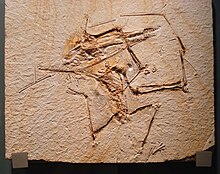Altmuehlopterus (meaning "Altmühl River wing") is a genus of pterosaur belonging to the Pterodactyloidea. It lived in the Late Jurassic of what is now Germany. It was formerly known as "Daitingopterus" (meaning "Daiting Wing"), a nomen nudum, informally coined in 2004.[1]
| Altmuehlopterus Temporal range:
| |
|---|---|

| |
| Holotype fossil BSP AS.I.745 in Jura Museum Eichstätt | |
| Scientific classification | |
| Domain: | Eukaryota |
| Kingdom: | Animalia |
| Phylum: | Chordata |
| Order: | †Pterosauria |
| Suborder: | †Pterodactyloidea |
| Infraorder: | †Eupterodactyloidea |
| Genus: | †Altmuehlopterus Vidovic & Martill, 2017 |
| Species: | †A. rhamphastinus
|
| Binomial name | |
| †Altmuehlopterus rhamphastinus (Wagner, 1851)
| |
Discovery and naming
editIn 1851, Johann Andreas Wagner named a new species of Ornithocephalus (a now-obsolete name for the genus Pterodactylus), Ornithocephalus ramphastinus. The specific name referred to the toucan genus Ramphastos, in view of the large beak-like snout of the pterosaur.[2] In 1859/1860, Christian Erich Hermann von Meyer corrected the specific name to rhamphastinus.[3] Although this was incorrect by modern standards, the new spelling has become valid by being accepted and used by subsequent authors, under article ICZN 33.3.1.[4]
The holotype, BSP AS.I.745, was probably found at Mörnsheim near Daiting in a layer of the Malm Zeta 3, dating from the Tithonian. It consists of a partly articulated skeleton with skull, preserved on a plate and counterplate.
In 1871, Harry Govier Seeley included the specimen in the type material of Diopecephalus, without, however, designating it as the holotype of this genus.[5] For this reason, Peter Wellnhofer felt free to name the specimen as a second species of Germanodactylus in 1970: Germanodactylus rhamphastinus.[6] In 2004, Michael Maisch e.a. concluded that it represented a new genus, which they indicated as "Daitingopterus" in a diagram.[1] It remained a nomen nudum.[7]
In 2017, Steven Vidovic and David Martill validly named a separate genus Altmuehlopterus. The generic name combines a reference to the river Altmühl, running through Solnhofen, with a Latinised Greek pteron, "wing".[7]
See also
editReferences
edit- ^ a b Maisch, M.W.; Matzke, A.T.; Ge Sun (2004). "A new dsungaripteroid pterosaur from the Lower Cretaceous of the southern Junggar Basin, north-west China" (PDF). Cretaceous Research. 25 (5): 625–634. doi:10.1016/j.cretres.2004.06.002.
- ^ Wagner, Johann Andreas (1851). "Beschreibung einer neuen Art von Ornithocephalus, nebst kritischer Vergleichung der in der k. palaeontologischen Sammlung zu München aufgestellten Arten aus dieser Gattung". Abhandlungen der koniglichen bayerischen Akademie der Wissenschaften (in German). 6: 1–64.
- ^ Meyer, H. von, 1860, Zur fauna der Vorwelt — Reptilien aus dem lithographischen Schiefer des Jura in Deutschland und Frankreich Heinrich Keller Verlag, Frankfurt am Main; 142 pp
- ^ Bennett, S.C., 2002, "Soft tissue preservation of the cranial crest of the pterosaur Germanodactylus from Solnhofen", Journal of Vertebrate Paleontology 22: 43–48
- ^ Seeley, H. G., 1871, "Additional evidence of the structure of the head in ornithosaurs from the Cambridge upper Greensand; being a supplement to “The Ornithosauria.”" Annals and Magazine of Natural History, Series 4 7: 20–36
- ^ Wellnhofer, P., 1970, "Die Pterodactyloidea (Pterosauria) der Oberjura- Plattenkalke Süddeutschlands", Bayerische Akademie der Wissenschaften, Mathematisch-Wissenschaftlichen Klasse, Abhandlungen 141:133 pp
- ^ a b Vidovic, S.U.; Martill, D.M. (2017). "The taxonomy and phylogeny of Diopecephalus kochi (Wagner, 1837) and "Germanodactylus rhamphastinus" (Wagner, 1851)". Geological Society, London, Special Publications. 455: 125–147. doi:10.1144/SP455.12. S2CID 219204038.
External links
edit- Restoration of "Daitingopterus" at The Grave Yard